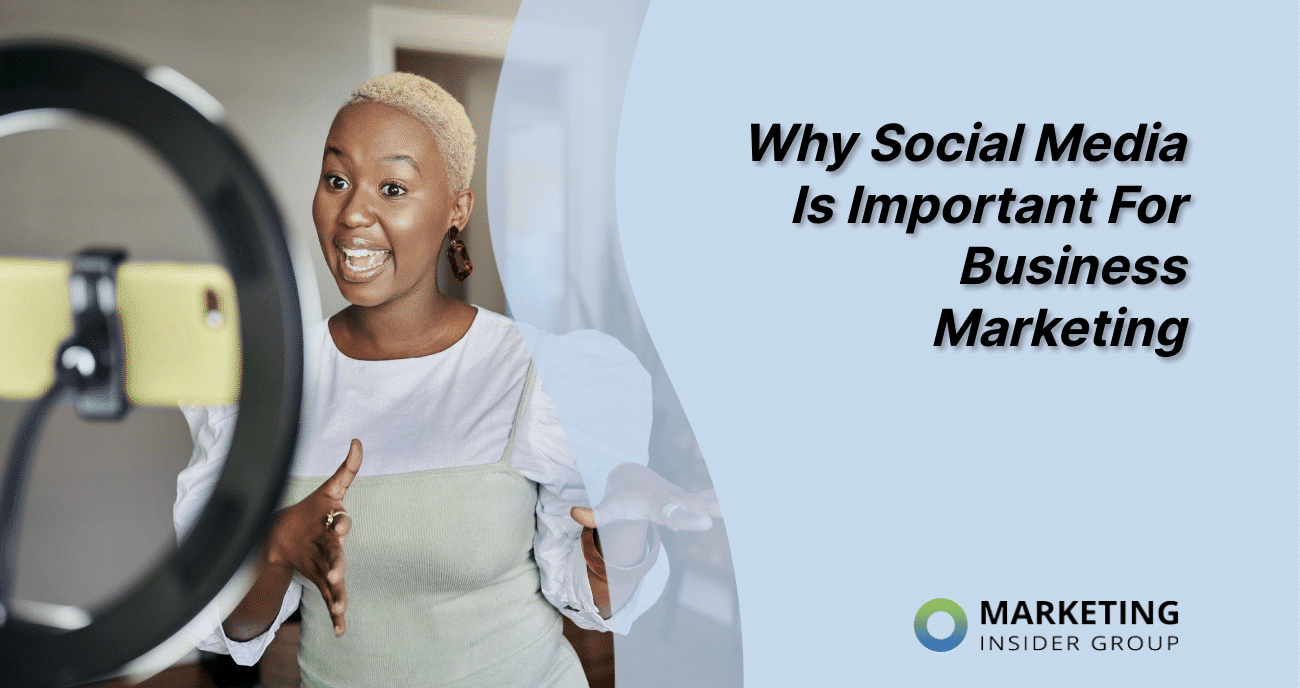
Why Social Media Is Important for Business Marketing
Let’s start with one simple fact: your business needs a social media presence.
It doesn’t matter if you run a small local shop or a big national company. Social media is more than just a trend. It is an essential piece of your business marketing strategy.
But by itself, social media is not enough to drive business growth.
Social platforms can help you connect with your customers, increase awareness about your brand, and boost your leads and sales.
But you need to start with an always-on mindset and a solid content marketing strategy.
Quick Takeaways:
- Social media is an effective way to reach new audiences with engaging content
- Social engagement helps you build trust, authority and also to show your brand personality
- You need a solid plan for engaging content to distribute via social media
PS – Check out our weekly blog content service that includes social media support!
With more than three billion people around the world using social media every month, the users and engagement on major platforms just keep increasing.
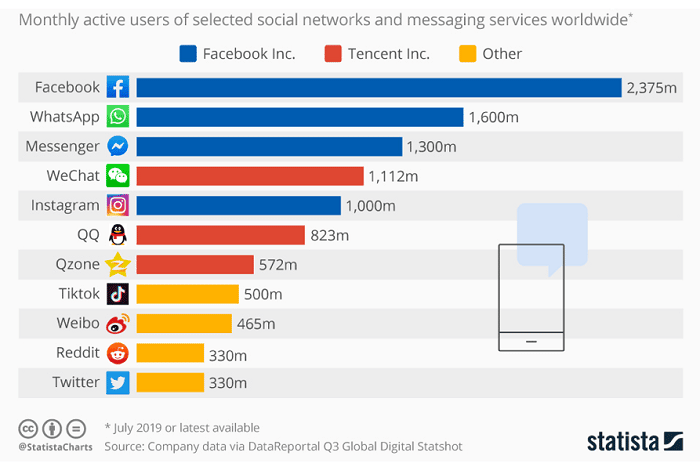
What you might not know is that you’re ready to get your company’s social media off the ground right now. You don’t need to know every intimidating buzzword or have the magic number of followers. You can get started immediately—and even enjoy yourself in the process.
Social media provides immense potential for businesses because consumers habitually log on to it daily and are exposed to companies. It also presents huge challenges for businesses, however, because it’s an ever-changing space that is extremely noisy and crowded.
It can be difficult to keep up with evolving trends on social media, so B2B reviews and ratings firm Clutch partnered with marketing agency Smart Insights to learn the current state of social media marketing; they surveyed 344 social media marketers from around the world to determine the value of social media, the most engaging content to share, common challenges, and what social media resources businesses are investing in.
The results?
- 52 percent of social media marketers believe social media positively influences their company’s revenue and sales.
- The five most valuable social media platforms:
- Facebook (89 percent)
- LinkedIn (83 percent)
- YouTube (81 percent)
- Twitter (80 percent)
- Instagram (56 percent)
- Nearly 80 percent of companies share mostly original content on social media.
- The most important metrics for companies are engagement (36 percent) and conversion rates (35 percent).
- Social media is more valuable to B2C (58 percent) than B2B companies (46 percent).
- The biggest challenges with social media are:
- Not having enough human and financial resources (26 percent)
- Lacking a formal strategy (24 percent)
- Building a community of followers and influencers (24 percent)
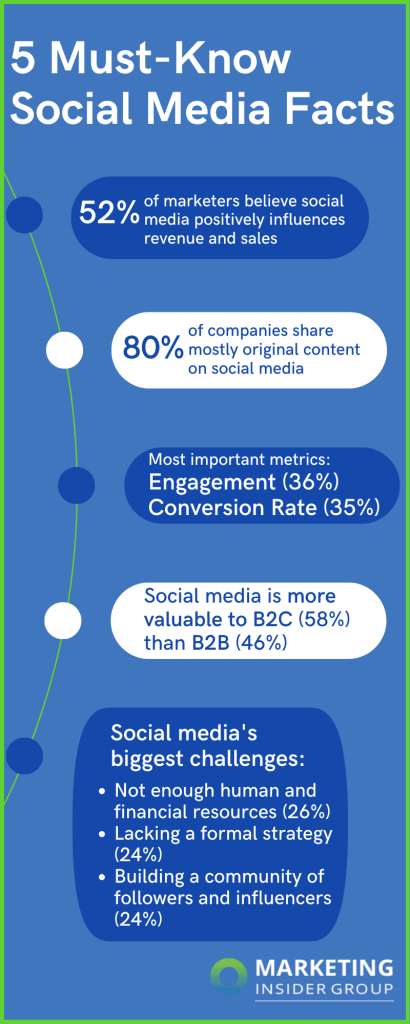
If you’re still not convinced, here are six things you can try out yourself to realize that social media is a wise business move.
1. Get Attention and Build Awareness
If people don’t know about your business, they can’t become your customers. Social media boosts your visibility among potential customers, letting you reach a wide audience by using a large amount of time and effort. And it’s free to create a business profile on all the major social networks, so you have nothing to lose.
Here’s a fact: social media content gets attention.
However, it’s really easy for a consumer to become overwhelmed on Facebook, Twitter, Instagram and other social media platforms filled with noise from companies trying to promote their brands. How can a company create relevant content in such a crowded space?
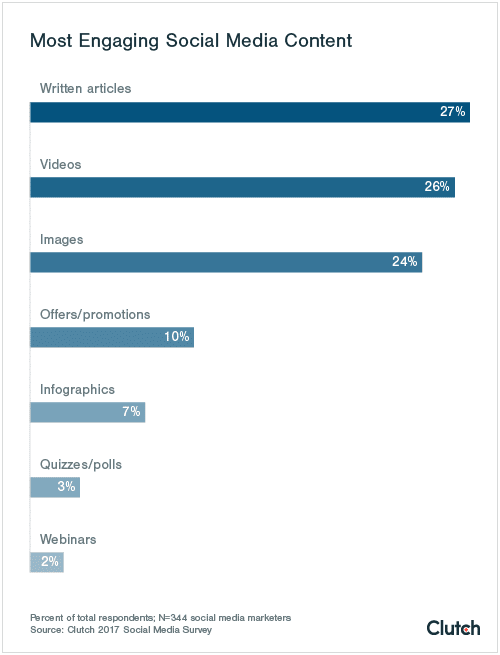
In the above survey, articles, videos and images were most successful at engaging customers and breaking through that noise.
“These content types are effective in getting cut-through in newsfeeds, so it’s important to not only use them, but to invest in them so the quality is there,” Smart Insights CEO Dave Chaffey said.
This is where original content intersects with quality design. Between GIFs, memes, Facebook Live and more, a content strategy has to be carefully thought-out and executed. What message do your customers want to see, how are they going to identify with your brand, and what will get them to click on your post or comment on it to garner a conversation?
Define what you want to get out of social media to develop a social media strategy for brand awareness. Do you want new customers to discover your services? Do you hope to bring more local shoppers into your stores? By keeping your strategy specific, you can determine which social media channels are the best fit for your business.
2. Communicate Authority
Customers are increasingly savvier and more discerning about which businesses they support. Before making a decision, they’ll do a quick search to browse your website and social media.
Will they find an empty storefront or a rich source of information? Setting up robust profiles that you update frequently with relevant content will build your brand’s authority and make sure you make a positive first impression through social media, showing that your business is trustworthy, knowledgeable, and approachable.
Look for ways to demonstrate your expertise as a thought leader in your industry—like writing pieces related to your expertise or expanding on your company’s mission. By showing what your business offers and values, you will establish confidence in potential customers.
3. Show Authenticity
Customers aren’t interested in businesses that publish dry, corporate-style social media posts.
Instead, let your brand’s personality shine through in everything you share on social media. What does your brand voice sound like? How does it represent who you are? While brands need to be polite and empathetic to their audiences, it is more important to find a voice and take a stand.
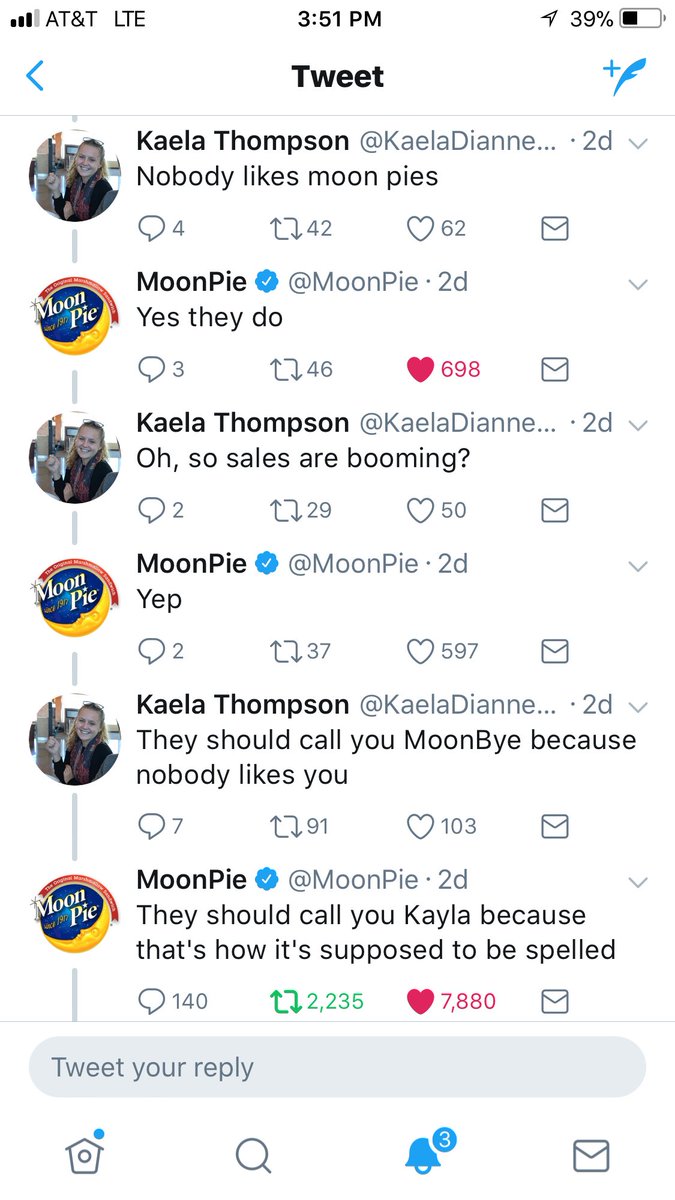
Practice getting your tone just right, whether it’s casual and funny or formal and friendly. Be true to who you are, not who you think you should be. Followers want to see real people behind your social profiles. Show them.
4. Encourage Engagement
Sometimes, a seemingly simple social media post, such as one promoting a pair of shoes, can receive several likes, comments, and shares. People can even ask strangers in the feed if they have received their shoes, how long the shipping took, if they liked them, and other questions.
Social media opens the conversation for instant interaction, relationship building, and customer loyalty.
“It’s really important that companies have the right organizational structure to support social media,” said Josh Krakauer, founder and CEO of Sculpt. “A customer support team and a product development team tends to be extremely effective.”
Social channels evolve, constantly releasing new features, and this rapidly changing environment can be intimidating for some business owners.
But remember: you don’t have to do everything. Play with new ways to connect with your audience, and give yourself permission to learn as you go. One day, you could post a series of Instagram Stories to give customers a behind-the-scenes tour of your office. The next, you could host a quick Q&A session via Facebook Live video streaming. Over time, you’ll get a better idea of your followers’ preferences.

You can create engaging video content for social media with a simple setup—good lighting, a smartphone, and a tripod. Also, do a test run before you go live to make sure your internet connection or hotspot has enough speed to avoid delays and interruptions.
PS – Check out our latest case study that shows how we helped one company double their leads!
5. Grow Affordably
Yes, social media isn’t a place to be overly salesy, but after all, it’s a marketing channel and you need not ignore the opportunity to make sales, should it present itself. Sponsored info on timelines, videos with CTAs, cross-channel retargeting and shoppable posts are the mainstay of social media.
Marketing costs add up, and not every business can afford huge campaigns. But you can get a lot of value for your dollar with social media advertising. Your business, regardless of size or budget, has an opportunity to grow your audience and reach your objectives through ads on social platforms like Facebook and Instagram. Even if platforms such as Instagram are primarily geared towards engagement, there are established ways to increase sales on them.
Most businesses are data-driven, but social media isn’t a set-in-stone science. For example, you can scroll by an ad that has a picture of a huge scoop of melting chocolate ice cream topped with a mound of whipped cream. You may not think twice about it, but three days later, you may stop by Baskin-Robbins because you were craving a scoop of chocolate ice cream. Social media can contribute to the buyer’s decision-making process like that.
“Social media, unlike other kinds of advertising, can be notoriously difficult to track,” said Steve Pearson, CEO of Friendemic. “Most consumers say it takes many touch points in their customer journey before a purchase. A lot of those are undoubtedly on social media and online review sites, but customers aren’t necessarily citing those when they walk into a business as the last touchpoint that brought them in today.”
When building an ad campaign, know who you’re trying to reach and what goal you want to achieve so you don’t waste any of your budget on unhelpful advertising. Avoid overly salesy ads, and opt for content that educates or entertains (or does both at the same time).
6. Provide Support
Social platforms have successfully broken down barriers between companies and their customers. Now, instead of calling a customer service line, many people turn to Facebook or Twitter to solve problems or find information.
Develop your reputation as a responsive, caring brand by offering support through social channels:
- Create a system for tracking customer comments, questions, and complaints on social media.
- Respond as quickly as possible to questions and concerns.
- Go out of your way to be positive and helpful.
- Listen to criticism and make customers feel heard.
- Know when to resolve public conversations in private messages.
5 Steps to Market Your Business on Social Media
At this point in time, there isn’t a single business that should not be marketing itself on social media. The opportunity to interact directly with your target audience should not, and cannot, be passed up.
However, many businesses throw together a profile haphazardly, and then don’t put the time and strategy into prioritizing its importance and success. You must put careful thought and consideration behind your social presence and then take it even further with paid campaigns to start generating leads for your business.
1. Create a strong profile
First things first, you’ll need to create a profile that represents your brand in a way that is professional and engaging. This all starts with creating a username/handle. When choosing a handle, shorter is better, consistency is key and getting your business’ name in there is essential.
Ensure that your profile provides all of the necessary information needed to drive prospective customers, partners and employees to your website. Include a summary of what your business does, contact information, links to relevant landing pages and anything else that could help your followers take the action your hoping for (i.e. fill out a contact form or apply for a job).
2. Get a content calendar going
It’s important to keep a steady cadence of content flowing from your channels. Create a calendar and populate it with a blend of content including promotions for your company’s events/webinars, any major company announcements, company blog posts, industry commentary and thought leadership, and any other content that your followers may enjoy.
It’s vital that you figure out the best posting cadence for your brand. Some channels, like Facebook, tend to decline in impressions and engagement if you post too often. Other channels, like Twitter, can see great success in posting several times per day. Do some testing to find what works best for you, and check your analytics to confirm you’re posting during periods when your audience is active.
3. Be social and start engaging
Once you have a robust profile with great content, it’s time to start engaging. At the end of the day, social media is meant to be social, so this is a core component of any good social media strategy.
Make sure you monitor and respond to mentions and comments in a timely manner. This is your chance to have direct interactions with your audience, so don’t let them down! You should also build lists to monitor so you can easily scroll and find posts to engage with. These lists can include partners, customers, influencers, relevant reporters and analysts, etc.
Find your voice when you start engaging and be consistent in tone with both posting updates and interacting with your audience. Consistency is key to maintaining an authentic brand image.
4. Build up your following with a paid campaign
It has become harder than ever to grow your following organically on some major social platforms, like Facebook. While posting regularly and engaging with your audience is an ideal way to organically grow your following, it’s also best to give yourself a boost with a paid follower campaign.
A paid follower campaign can mean the difference between having 1,000 followers and 10,000 followers. It’s a worthwhile investment to grow your audience, given the time and effort you’ll be putting into your ongoing social strategy. A little budget can go a long way with a paid follower campaign.
5. Start bringing in leads
Now that you have built a strong profile, with a robust content calendar and you have large and engaged audience, it’s time to start using social media to boost ROI. Twitter, Facebook and LinkedIn are great channels to run lead gen campaigns.
Using each platform’s ads manager tool, you can create campaigns targeted to the exact buyer persona you’re after. All you need is compelling imagery, attention grabbing and informative ad copy, and you’re good to go! It’s also best to add UTM codes in your links to track conversions in Google Analytics, or whatever tools your business prefers. Alternatively, you can even use the conversion tracking tools available through each social platform.
Over to You
Social media is a crucial part of your business marketing, but it doesn’t have to be stressful to manage. Take the first step, create a profile, and start engaging with your customers.
As it continues to weave itself into the daily patterns of our lives, more consumers will go to new and upcoming social platforms for purchasing decisions. Those who have a strong social media presence and branding will increase conversion rates, while those without active social media campaigns could lose potential customers. Which company do you want to be?
Need Engaging Content for Your Social Media?
If you are ready to get more traffic to your site with quality content that’s consistently published, check out our Content Builder Service. Set up a quick consultation, and I’ll send you a free PDF version of my books. Get started today and generate more traffic and leads for your business.

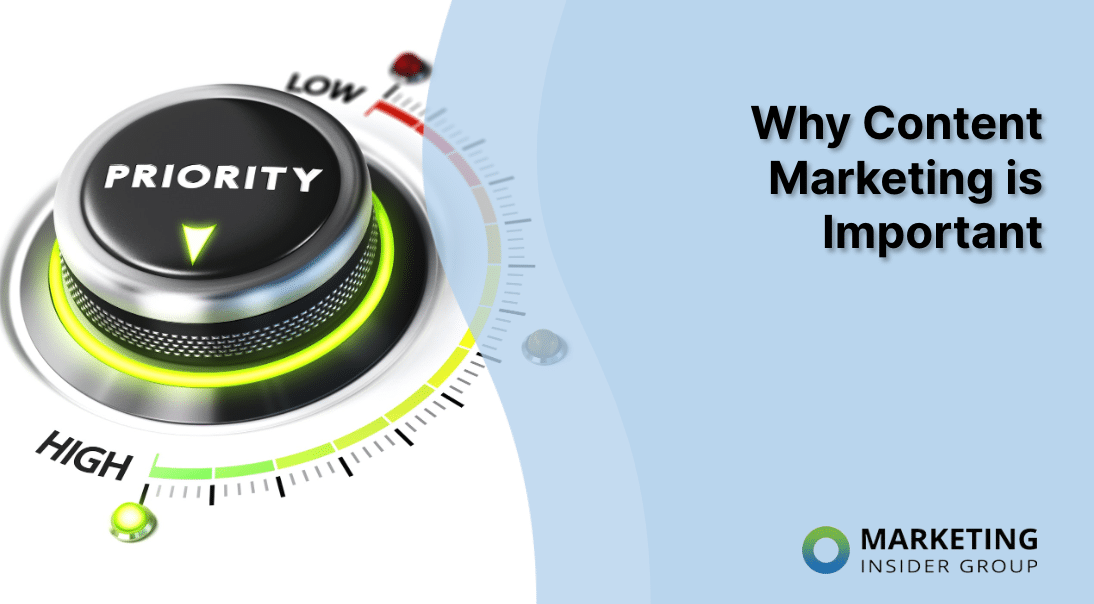





Hi, Thank you for sharing such kind of information. it will help me to increase visibility online Labradorite market.
Social media is simply another show of proof for people searching you out as well that you know what you’re talking about! Even I’ve caught myself looking up others whom I was interested in either training, or working with, on Facebook to see that their profile is setup nicely.
Social media is a massive lead generation, branding, etc for any business or company.
Without it, a lot of companies are missing out on the bigger picture and what’s still to come!
Great points in this post, and great job!
Thanks for sharing, so glad this has been helpful to your work!
Absolutely, social media is all about brand identity! Thanks for the feedback.
Hi which platforms do you think are best if you only want to use a couple or do you think you should use all of them? Thanks
Hi Sarah,
I think it really depends on which platforms your customers are using and also which platforms seem to create engagement for your brand. For example, I get a ton of traffic to this site from Twitter (more than 10%) and a couple percentage points from Linkedin and around 1% from Facebook. I get nothing from Instagram so I don’t even have a branded account there. But for your company it might be different. Best thing is to test and learn.
Thanks for sharing such a informative blog with us. This is really useful, I really need it and i will start to implement it.
Thanks for such informative content. It was really helpful for me. I will start using social media to uplift my business.
Thanks and best of luck.
I read this page because it didn’t have pop ups all over it.
The Importance which you gave was very right and real thank you.
It was full of a lot of information. I learned a lot about social media. The 5 sides are discussed in detail.